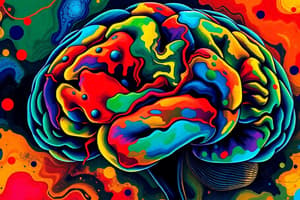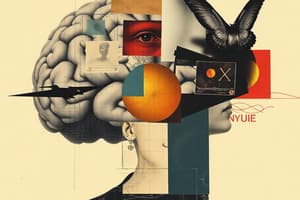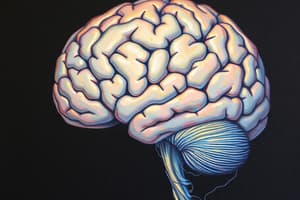Podcast
Questions and Answers
What is a primary aspect of genetic drift?
What is a primary aspect of genetic drift?
- It only occurs in large populations.
- It can lead to the spread of genes by accident. (correct)
- It exclusively spreads beneficial genes.
- It requires a mechanism for natural selection.
What does a functional explanation provide insight into?
What does a functional explanation provide insight into?
- Why a structure or behavior evolved. (correct)
- The historical significance of all behaviors.
- The efficiency of genes in large populations.
- The accidental distribution of genes.
How did Aristotle's perspective on behavior differ from modern understandings?
How did Aristotle's perspective on behavior differ from modern understandings?
- He considered the brain as the center of consciousness.
- He viewed the mind as an entity independent of the body. (correct)
- He believed both mind and brain were essential.
- He viewed behavior as purely a physical process.
What is mentalism as defined in the content?
What is mentalism as defined in the content?
In which population size is genetic drift most powerful?
In which population size is genetic drift most powerful?
What assumption can be made about a gene that becomes common in a large population?
What assumption can be made about a gene that becomes common in a large population?
Which psychological terms are influenced by Aristotle's mentalism?
Which psychological terms are influenced by Aristotle's mentalism?
What distinguishes evolutionary explanations from functional explanations?
What distinguishes evolutionary explanations from functional explanations?
What does a physiological explanation of behavior primarily relate to?
What does a physiological explanation of behavior primarily relate to?
Which explanation traces the development of behaviors and structures throughout an individual's life?
Which explanation traces the development of behaviors and structures throughout an individual's life?
How does an evolutionary explanation relate to modern behaviors?
How does an evolutionary explanation relate to modern behaviors?
What might physiological explanations help us understand about hormones?
What might physiological explanations help us understand about hormones?
What key factors does an ontogenetic explanation consider in shaping behavior?
What key factors does an ontogenetic explanation consider in shaping behavior?
Which of the following is an example of a physiological explanation?
Which of the following is an example of a physiological explanation?
What does an evolutionary explanation of goosebumps suggest?
What does an evolutionary explanation of goosebumps suggest?
In the context of behavior, what distinguishes a functional explanation?
In the context of behavior, what distinguishes a functional explanation?
What is the central structure involved in Descartes's explanation of how the mind interacts with the body?
What is the central structure involved in Descartes's explanation of how the mind interacts with the body?
Which term describes the problem associated with explaining the interaction between a nonmaterial mind and a physical brain?
Which term describes the problem associated with explaining the interaction between a nonmaterial mind and a physical brain?
What alternative theory to dualism is defined as the belief that the universe consists of only one kind of substance?
What alternative theory to dualism is defined as the belief that the universe consists of only one kind of substance?
What key concept was advanced by materialism in relation to behavior?
What key concept was advanced by materialism in relation to behavior?
Which scientists independently developed the theory of evolution by natural selection?
Which scientists independently developed the theory of evolution by natural selection?
What role does the pineal gland play in modern biology?
What role does the pineal gland play in modern biology?
What is dualism primarily concerned with regarding the entities of human behavior?
What is dualism primarily concerned with regarding the entities of human behavior?
Which category of monism emphasizes the belief that the brain's physicality explains all mental processes?
Which category of monism emphasizes the belief that the brain's physicality explains all mental processes?
Flashcards are hidden until you start studying
Study Notes
Biological Explanation of Behavior
- Behavior explanations often imply intentional goals, but intentions cannot always be assumed.
- Biological explanations encompass physiological, ontogenetic, evolutionary, and functional perspectives.
Physiological Explanations
- Relate behavior to brain and organ activity, focusing on body mechanisms, such as hormone influence and muscle control.
- Example: Chemical reactions in the body that mediate hormone effects on brain processes.
Ontogenetic Explanations
- Originates from Greek terms meaning “to be” and “origin,” explaining the development of structures and behaviors.
- Considers genetics, nutrition, and experiences in shaping behavior; e.g., impulse control develops from infancy to adolescence with brain maturation.
Evolutionary Explanations
- Reconstruct the evolutionary history of behaviors or structures.
- Example: Goose bumps in humans are inherited traits from ancestors, initially useful for intimidation in larger mammals.
Functional Explanations
- Describe the purpose behind structures or behaviors and their evolutionary advantages.
- Genetic drift can spread traits in small populations; common genes in larger populations typically confer benefits in historical environments.
Perspectives of Brain and Behavior
- Mentalism: Originating from Aristotle, suggests behavior is controlled by a nonmaterial psyche, excluding brain function.
- Dualism: Descartes proposed a mechanical view where the mind directs a physical body, leading to the mind-body problem, as it fails to explain their interaction.
- Materialism: Emerged in the 19th century, positing that brain and nervous system mechanisms solely account for behavior, supported by Darwin and Wallace's evolutionary theory.
Key Philosophers
- Aristotle: Attributed consciousness and behaviors to the psyche, independent of the body.
- Descartes: Introduced the pineal gland as the interaction point between mind and body; the theory struggled with the mind-body issue.
- Darwin and Wallace: Proposed natural selection, highlighting the common genetic traits among species and their evolutionary significance.
Key Concepts
- Mentalism: Mind as the sole entity influencing behavior.
- Dualism: Behavior controlled by both mind and body.
- Monism: Universe consists of one substance; includes materialism, mentalism, and identity positions.
Studying That Suits You
Use AI to generate personalized quizzes and flashcards to suit your learning preferences.





